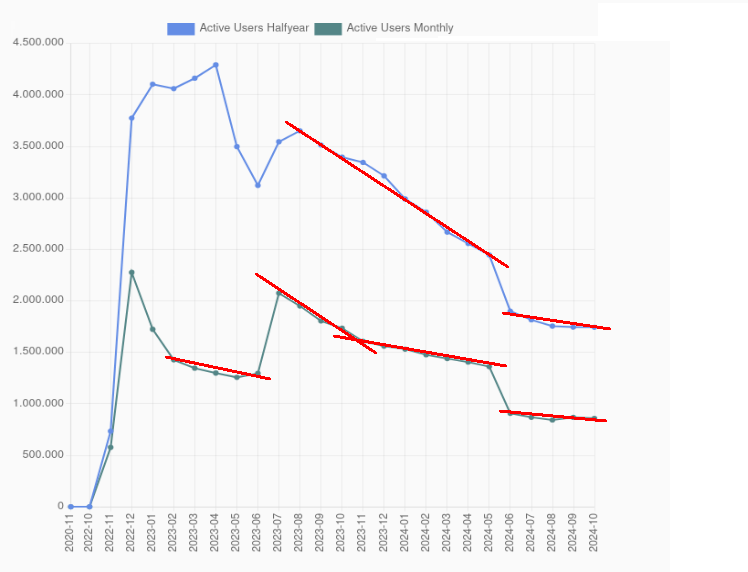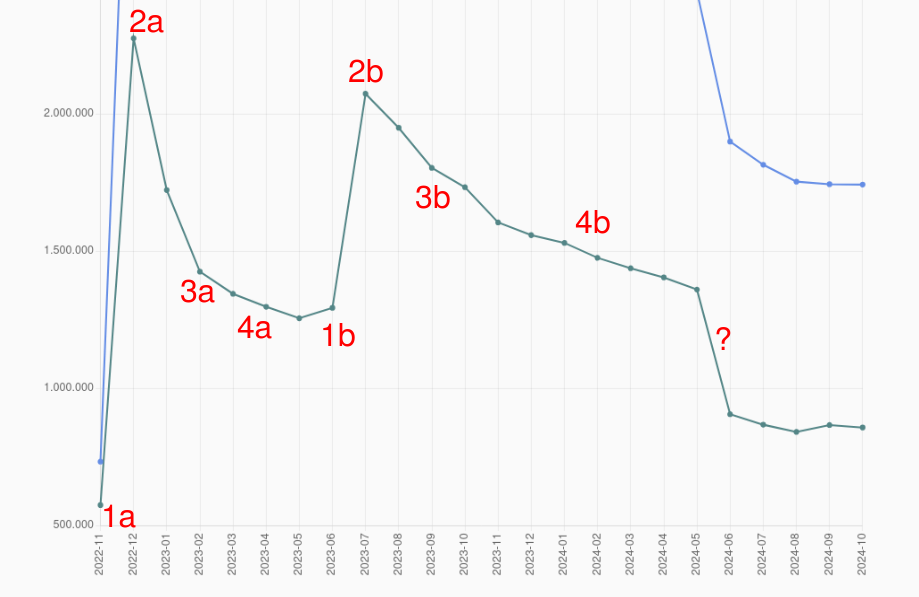I don’t like the clickbait title at all – Mastodon’s clearly going to survive, at least for the forseeable future, and it wouldn’t surprise me if it outlives Xitter.
Still, Mastodon is struggling; most of the people who checkd it out in the November 2022 surge (or the smaller June 2023 surge) didn’t stick around, and numbers have been steadily declining for the last year. The author makes some good points, and some of the comments are excellent.
Because Threads and BlueSky form effective competition with Twitter.
Also, short form content with just a few sentences per post sucks. It’s become obvious. That Twitter was mostly algorithm hype and FOMO.
Mastodon tries to be healthier but I’m not convinced that microblogs in general are that useful, especially to a techie audience who knows RSS and other publishing formats.
short form content with just a few sentences per post sucks.
I 100% agree with this sentiment.
Jaron Lanier has a great book called You Are Not A Gadget, where he talks about the way we design and interact with systems, and he has some thoughts I think reflect this sentiment very well:
“When [people] design an internet service that is edited by a vast anonymous crowd, they are suggesting that a random crowd of humans is an organism with a legitimate point of view.” (This is in reference to Wikis like Wikipedia)
“Different media designs stimulate different potentials in human nature.”
He talks about how when a system becomes popular enough, it can “lock in” a design, when others build upon it as standard. Such as how the very concept of a “file” is one we created, and nearly every system now uses it. Non-file based computing is a highly unexplored design space.
And the key part, which I think is relevant to Mastodon, the fediverse, and social media more broadly, is this quote:
“A design that share’s Twitter’s feature of providing ambient continuous contact between people could perhaps drop Twitter’s adoration of fragments.”
Fragments, of course, meaning the limited, microblogging style of communication the platform allows for. I’ve seen some Mastodon instances that help with this, by not imposing character limits anywhere near where most instances would, opting for tens of thousands of characters long. But of course, there is still a limit. Another design feature by Twitter that is now locked in.
But of course, people are used to that style of social media. It’s what feels normal, inevitable even. Changing it would mean having to reconceptualize social media as a concept, and might be something people aren’t interested in, since they’re too used to the original design. We can’t exactly tell.
As Lanier puts it,
“We don’t really know, because it is an unexplored design space.”
Non-file based computing is a highly unexplored design space.
No it isn’t; that’s what databases are.
That’s what some databases are. Most databases you’ll see today still inevitably store the whole contents of the DB within a file with its own format, metadata, file extension, etc, or store the contents of the database within a file tree.
The notion of “lock in” being used here doesn’t necessarily mean that alternatives don’t or can’t exist, but that comparatively, investment into development, and usage, of those systems, is drastically lower.
Think of how many modern computing systems involve filesystems as a core component of their operation, from databases, to video games, to the structure of URLs, which are essentially usually just ways to access a file tree. Now think of how many systems are in use that don’t utilize files as a concept.
The very notion of files as an idea is so locked-in, that we can rarely fathom, let alone construct a system that doesn’t utilize them as a part of its function.
Regardless, the files example specifically wasn’t exactly meant to be a direct commentary on the state of microblogging platforms, or of all technology, but more an example for analogy purposes than anything else.
What social media platforms don’t have some kind of character limit?
What platforms don’t use a feed?
What platforms don’t use a like button?
What platforms don’t have some kind of hashtags?
All of these things are locked-in, not necessarily technologically, but socially.
Would more people from Reddit have switched to Lemmy if it didn’t have upvotes and downvotes? Are there any benefits or tradeoffs to including or not including the Save button on Lemmy, and other social media sites? We don’t really know, because it’s substantially less explored as a concept.
The very notion of federated communities on Lemmy being instance-specific, instead of, say, instances all collectively downloading and redistributing any posts to a specific keyword acting as a sort of global community not specific to any one instance, is another instance of lock-in, adapted from the fediverse’s general design around instance-specific hosting and connection.
In the world of social media, alternative platforms, such as Minus exist, that explore unique design decisions not available on other platforms, like limited total post counts, vague timestamps, and a lack of likes, but compared to all the other sites in the social media landscape, it’s a drop in the bucket.
The broader point I was trying to make was just that the very way microblogging developed as a core part of social media’s design means that any shift away from it likely won’t actually gain traction with a mainstream audience, because of the social side of the lock-in.
Wow!
“Minus is a finite social network where you get 100 posts—for life.”
@grue @ArchRecord An example of a database that doesn’t keep it’s data in files?
I’m not a big expert on database technology, but I am aware of there being at least a few database systems (“In-Memory”) that use the RAM of the computer for transient storage, and since RAM doesn’t use files as a concept in the same way, the data stored there isn’t exactly inside a “file,” so to speak.
That said, they are absolutely dwarfed by the majority of databases, which use some kind of file as a means to store the database, or the contents within it.
Obviously, that’s not to say using files is bad in any way, but the possibilities for how database software could have developed, had we not used files as a core computing concept during their inception, are now closed off. We simply don’t know what databases could have looked like, because of “lock-in.”
Memory is still structured like a file and referenced over addresses, we just call it something else.
Bluesky certainly provides another option … when Apartheid Clyde led to Twitter getting shut down in Brazil, there was a small bump in Mastodon’s numbers, but a much bigger influx to Bluesky. Then again Bluesky’s addressed a lot of problems people coming to Mastodon in 2022 had, and Mastodon hasn’t, so if everybody had come to Mastodon instead the pattern would likely have repeated itself and most of them wouldn’t have stuck around.
What are some of the issues you’d like to see addressed? I don’t use mastodon as much so I’m not familiar with what has / hasn’t been done.
ex. I hear they’ve been working on content discovery, such as with the recommended accounts carousel
https://erinkissane.com/mastodon-is-easy-and-fun-except-when-it-isnt is a good overview (not by me!) of issues that the November 2022 wave ran into. What’s frustrating is that so many of these are very similar to the issues the April 2017 wave ran into!
Release 4.3 did some work on the recommended accounts, that’s good, but the problems start even before that. What instance to sign up to? Most people have better experiences on smaller instances that match either their interests or their geography … but how to find them? mastodon.social is (for most people) kind of meh – certainly not the worst, but it’s not all that well-moderated, and it’s big enough that the local feed isn’t useful for finding interesting people or stuff – and that’s now the default. Also it took over a year to get 4.3 out; I get it, they’re a small team, some stuff turned out to be a lot harder than expected, and they had to deal with a bunch of security patches in the interim … still, that means progress is frustratingly slow.
The fact that like an rethreads are not federated is I pretty big issue. Like if you come from a small instance, you’ll see most global posts at 0 likes, which makes the platform look dead.
Thank you!
@otter @thenexusofprivacy I personally find the three-pane design a bit “busy”.
Also, short form content with just a few sentences per post sucks
Your post could fit on Mastodon
My post above is 376 characters, which would have required three tweets under the original 140 character limit.
Mastodon, for better or worse, has captured a bunch of people who are hooked on the original super-short posting style, which I feel is a form of Newspeak / 1984-style dumbing down of language and discussion that removed nuance. Yes, Mastodon has removed the limit and we have better abilities to discuss today, but that doesn’t change the years of training (erm… untraining?) we need to do to de-program people off of this toxic style.
Especially when Mastodon is trying to cater to people who are used to tweets.
Your post could fit on Mastodon
EDIT: and second, Mastodon doesn’t have the toxic-FOMO effect that hooks people into Twitter (or Threads, or Bluesky).
People post not because short sentences are good. They post and doom-scroll because they don’t want to feel left out of something. Mastodon is healthier for you, but also less intoxicating / less pushy. Its somewhat doomed to failure, as the very point of these short posts / short-engagement stuff is basically crowd manipulation, FOMO and algorithmic manipulation.
Without that kind of manipulation, we won’t get the kinds of engagement on Mastodon (or Lemmy for that matter).
My Mastodon instance uses a 500 character limit
Look I love lemmy/reddit style social networks and I don’t disagree with the shallow reasons for why twitter has a character limit but there are legitimate and interesting reasons for character limits to posts. Is it better? probably not but sometimes less is more.
They are in competition with Mastodon, and have a marketing budget.
Five years from now, those platforms will become enshittified as their budgets dry up. They will need to milk the users for revenue. Well see another surge in a few years, until they learn that Mastodon is actually better.
Then the next Billionaire with a massive ego and huge budget comes out and makes another one.
Or we get Jack Dorsey making a new company for a 3rd time.
@dragontamer @thenexusofprivacy
“short form content with just a few sentences per post sucks”
I agree and that’s why the first site I put up was friendica, but I find on friendica, even though people have the space to express their thoughts in depth and eloquently, few do so, so perhaps Mastodon is so successful because it appeals to people who are incapable of effective self expression. At any rate, it is a reality that it is, so I do run one of those also.
Microblogging is definitely useful for many things, short and quick thoughts, links to news articles, jokes, memes etc. You can also comment and share things easily. Microblogging actually resembles instant messaging in a lot of ways, just with an undefined ’group chat’ size.
I find it kinda funny that Twitter has become so toxic that people start thinking there must be something wrong with the format.
Also RSS clearly can’t replicate a big chunk of the desirable properties of microblogging (eg. easy sharing and commenting).
It’s not dead but it has one big and massive issue that prevents mass adoption - discovery. If I can’t just write the name of my friends in search and find them no matter where they made their account - for an ordinary user, or one that comes from centralized services, this seems extremely alien and hostile.
And in the end, if you can’t find your friends, you want to interact with, what is the point of using the service?
Luckily, Mastodon is working on a discorvery protocol that should offer a way to find people across the board, which will hopefully make the Fediverse “appear” centralized to the average Joe while maintaining all the benefits of decentralization to the advanced users.
I guess it’s for people like me, who have no friends?
William Shatner couldn’t find me on Mastodon
You can put in their handle, with the domain they’ve signed up with
If you’re looking for more wider fuzzy search for that; mastodon 4.4 is gonna implement independent search services, meaning that search will be expanded beyond one server, and you can find new accounts on other servers just by keywords
I don’t know or need to know the handle. I know my friends name and surname and that must be more than enough. Facebook doesn’t need “@facebook” and twitter doesn’t need “@twitter” to find people if they exist there. I know the feature is coming but it is the key to make it accessible to wide range of average Joes who don’t want to, in their own vision, be rocket scientists to find people on the fediverse. It needs to be as simple as on facebook or other networks.
I know my friends name and surname and that must be more than enough.
I see. However; no.
Problem: even with discovery, if your friends are on Threads or X, you still won’t find them on Mastodon. But its a step in the right direction.
You would be able to find them if every instance didn’t decide to defederate with Threads.
Unless you can follow specific people on blocked instances, this is a fail. If my friend is on another instance which is blocked from my instance… whats the point of the fediverse? Might aswell go back to Facebook or X/Twitter. They are shitty but at least I can see my friends.
Luckily, Mastodon is working on a discorvery protocol that should offer a way to find people across the board, which will hopefully make the Fediverse “appear” centralized to the average Joe while maintaining all the benefits of decentralization to the advanced users.
I’d bet that this will be so proprietary and non-standard again that it’ll only work within Mastodon, maybe plus a few of its own soft-forks, effectively ignoring 30% of the Fediverse.
It’s open source standard, anyone can contribute…
I don’t understand. Mastodon has implemented global search a while ago. If I type “Steve” in the search bar, I get Steves from all sorts of places, not only from my instance.
Or are you talking about some sort of “contacts scan” implementation?
this right here
i have a mastodon account but it’s completely useless for me.
the only thing i use twitter for is to follow updates and news from professional journalists and artists who are not on mastodon and likely will never be. if your job depends on twitter, switching to mastodon is not going to happen.
if i want to engage with random average people, i come here to lemmy.
Uff, imagine getting news from a rightwing nutjob owned social network. Big yikes.
sports news, get off your high horse.
Sure, blue checkmark.
you are everything that’s wrong with the internet.
No u
Personally, I just don’t enjoy that Twitter-like format. I never used Twitter so I find it… Awkward? To me its kinda like a platformer with bad controls, everything else about the game might be great but if it doesnt feel satisfying to play, I’ll skip.
I still have my account and Megalodon on my phone but I just can’t get into it.
I’m with you on the Twitter style format. Reddit / Lemmy is nice because you can have actual conversations. Twitter you are basically shouting into the void and sometimes it shouts back.
That format was pretty good for “Come see us live at the Sodbury Theatre in Glurpfortshire, Feb 32nd @9PM!”
I remember an instance where a Cracked.com article pointed out something like “5 creepy places on the internet” one of which was a dicussion forum in which one account was posting over and over, many times a day, about public appearances and such of the cast of Buffy the Vampire Slayer, and readers showed up en masse to harass this person. Turns out she was off-label using a forum engine as her own little microtwitter to publish alerts to a fan club. But when the Cracked author rejected that context and substituted his own, it smelled a lot like Humanbeing151.
But yes in general I find discussion boards to be more useful; I think it’s why they were invented first; Reddit and Lemmy are basically just different approaches to implementing Usenet.
Mastodon is pretty different to its competitors. It looks similar to Twitter / Bluesky, but the way the social network functions is completely different.
It’s designed to be anti-infuencer… One of the things I hate about most social media platforms is a few people get all the attention. There are a few reasons for this, but it’s not really based on merit.
I think a lot of people joined Mastodon wanting a Twitter clone. It’s obviously not and Bluesky is, so people moved there. The approach Mastodon takes is far from perfect, and may not work out in the long run. But it seems like it’s worth at least trying something different.
It’s designed to be anti-infuencer
When my own feed, free of the algorithm, did not have content of interest. Because I or others took turns shouting into the void. Then I would go on the explore /front page where there was definitely an algorithm of influencers, many who had follower counts of thousands, talking about the same stuff. Many seemed to be upper middle class Americans .
I soon hated them, but many were broadcast to other instances’ front page too. Between them and lack of interaction from people I wanted to hear from, I left
I’ll say it again, the name sucks. It’s not cute, it sounds like mastrubate compared to twitter, it just is not catchy.
TicTic, snapchat, the apps that make it have a stupid catchy name, mastadon ain’t it.
Maybe rebrand as Y
Twitter really isn’t that much better. I remember when Twitter first started and it was getting a lot of crap for its weird name and that you made tweets. It count on eventually, but it’s going to take constant exposure.
I do kind of like that they call messages “toots.” That’s my kind of stupid.
Better name than X.
Mastodon wasn’t launched by a VC-backed Silicon Valley startup to become the phone app that replaces Twitter.
It was created by a German high school graduate and metalhead all alone as not much more than StatusNet with a different UI and some features cut for simplicity. It was designed by a nerd for nerds, nerds who didn’t rely on phone apps for everything. At this level, and back in 2016, not even an official native iPhone app was mandatory.
i think maybe because it has 3 syllables
because its name is Mastodon, something that when people google it pulls up a band.
Also because it’s trying to be a hot fresh new thing but it’s literally named after an animal that’s extinct.
If it had a catchier and more unique name it probably would have caught on more.
I hear “Twitter” is available again
ZING!
And dipshit elon literally argued in court that “twitter doesn’t exist anymore”
HMMM MAYBE SOMEBODY SHOULD INVENT IT
🤔
Yeah, lemmy suffered from this too, SEO is completely neglected when picking name.
Mastodon is not struggling.
- Mastodon is not a single entity, if mastodon.art dies tomorrow I would just create a new Mastodon profile on another instance.
- Yeah, Mastodon use surged in 2022 and 2023, and yeah most users didn’t stay around, but compared to the numbers before 2022, Mastodon has s big bump of new users.
Looking at two surges of new users seeing the vast majority not stick around and missing that a sizable chunk still stayed is missing the point.
This article would never have been written if the user increase didn’t have temporary surges, that result would be the same number of users, but less brand recognition.
Mastodon is also not driven by the same kind of metrics as a centralized system, plenty of people can just run their own instance just for the fun of it, they don’t need constant growth.
So calm down, and take it slow.
Don’t sell Mastodon short.
But the issue is that the temporary surges are not even followed by stability, they’re followed by decline. That’s not a recipe for sustainability.
Don’t sell Mastodon short.
Alternative analysis: it doesn’t help it to pretend there’s not a problem.
But the issue is that the temporary surges are not even followed by stability, they’re followed by decline. That’s not a recipe for sustainability.
You mean after a surge there’s less active users than before?
The graphs suggest that there is a dependence on surges to counteract slow decline.
On the very end of the graph you can see it sort of beginning to stabalize, there was even a small uptick in the second to last point, and sure, the last point shows a small decrease again.
My point is that it is too early to call out for danger regarding mastodon, that is too alarmist and may scare new users from the platform, speeding up the end of Mastodon.
So untill we have a period of time without surges it is hard to determine user growth
Fair enough.
I use mastodon every day and I’m glad it’s not dominate. It’s not a vc funded a shit hole looking for a growth market. I use mastodon because not every one is there, is a nice little niche place where I can play with my friends in peace
Mastodon is the only place where I don’t get triggered, and instead get inspired and/or informed.
Good moderation, no bots, no fascists, no “famous, because stupid” idiots. Just a nice bunch of people sharing cool, interesting shit. I absolutely love it.
Pew pew pew
I agree with top comment.
I’m Indonesian. Most of trending fediverse are Western related topics which It’s not relevant to me.
There’s one time when I randomly post about my country politics, and people on Mastodon just assume or comment using Western mindset.
Other than this Lemmy account, I mostly stick with hobby-related fediverse that mostly East Asian and Southeast Asian people (mostly Misskey instance)
Also, Indonesian is currently the highest user on Twitter, recently bypassed Brazil. People still use it as our local feed is… well localized. No Western-related discussion and much more comfy.
That was a great comment. It’s frustrating because the fediverse should be good at making it easy for people to find topics their interested in … but it doesn’t work out that way in practice.
I think a better title & question would be, “Why is Mastodon struggling to thrive?”
It’s surviving no problem, but it’s not thriving for a multitude of reasons. Some are pretty well covered across comments here & in the linked discussion, and are more or less reiterations of prior discussions on the matter.
Ultimately I think as much as many of those reasons are correct, the biggest reason is the same as ever: network effects. All the jank and technical details could be endured and adjusted to if there was sufficient value to be had in doing so, i.e. following accounts of interest/entertainment, connecting with friends, etc. That’s proven to varying degrees by those that have stuck with Mastodon. In turn, however, it’s also clear by how many bounce off that for many there’s still insufficient value to be found across Mastodon instances to justify dealing with all the rough edges.
If Mastodon had enough broadly appealing/interesting people/accounts across its instances, people might deal with the various technical and cultural rough spots the same way they deal with similar on other social networks they may complain about yet won’t leave. There still aren’t enough of those sorts on there for many though, so Mastodon simply survives but doesn’t thrive.
Agreed, that would have been a much better title. There’s a lot of negativity around Mastodon – the Twitter migration in 2022 is often described as a “failure”. It certainly wasn’t a success, but I see it much more as a missed opportunity.
Network effects are certainly a big deal but every social network has to deal with the issue, and some succeed. Addressing some of the reasons for bouncing not only improves retention, but makes it more likely that people recommend it to their friends. So many of the problems from July 2023’s Mastodon Is Easy and Fun Except When It Isn’t were problems back in 2017 as well … how much progress has Mastodon made? Fortunately other fediverse software’s making more progress, but it’s still frustrating.
@thenexusofprivacy So, I’ve just kinda got a stream of random tidbits here that’ll hopefully sorta surmise my thoughts.
The good:
First off, it’s shrunk but it’s by no means dead. Things grow and shrink and grow again, if it was a straight line with no variation I’d assume it was fake.
Also, Mastodon is not all of activity pub. Threads has brought a lot if people onto the protocol, and while it’s still in development it seems to be intended to work interoperably and the devs said they plan to let people migrate out and take their following/followers with them. I expect this to really supercharge the ecosystem.
The indifferent:
This isn’t 2020 anymore, and there’s more protocols out there. Nostr, in my opinion, is leagues better in the decentralization and user options/customizations department. AT (Bluesky) is leagues better in the end user was of use department. Both of those protocols are also much, much, lighter to host.
Activity pub also has it’s advantages of course. Being the oldest and also being great for communities are two quite big ones.
Some people have chosen to either leave Activity Pub for those protocols, or joined the decentralized ecosystem directly into one of the other two. It’s indifferent, though, because it’s a decentralized ecosystem. All three can chat with each other, so Mastodon & Activity Pub may have shrunk - but the amount of people you can communicate with on them has risen exponentially thanks to bridges.
The ugly:
Federation is a mess. You can have a dozen friends on Activity Pub, a dozen on other protocols connected via bridges or threads and find you can only talk to two or three. That’s a problem; most would give up before understanding why, and many more would likely figure out why and the decide it’s not worth their time working around. After the Bluesky wave I’ve heard Mastodon be called some variation of “bickering fiefs” a couple dozen times.
There’s also some toxicity within the space. Most people I’ve interacted with have been great, but it still rears it’s head now and then. You can get nearly bullied off the platform if you suggest people be nice to Windows users. It was kinda funny to see that blog post shortly after I jokingly said “you guys would probably put a hit out on me if I said I was using Windows” in a similar thread. In a similar vein, while accessibility is great, I’d bet more people have left the protocol after being yelled at for not using alt text then there are users who rely on alt text.
My predictions:
I’d bet that all three protocols grow a lot in the future and that more platforms start integrating one or more of the three big protocols. It’s a cheat code for new platforms to automatically have a bunch of content, and it’s free platform software already built. Federation issues and fediverse specific toxicity issues will potentially be eternal septembered away. Most people won’t care what OS you use and will want to be able to talk to their friends as apposed to having current federation. There might be a small splinter group of the older crowd using opt-in federation, but most of the ecosystem will change if it grows.
I’d also bet the three big protocols will continue to get closer. All three can already communicate, and heck, I, as an incompitant programmer, made a quick script that lets any Nostr client communicate with Mastodon &/or Bluesky. Throw some compitant devs at it and soon enough you probably won’t even be able to tell at first glance what protocol the other person you’re communicating with is on. Bluesky and Nostr in the mix bring Mastodon’s ~800k monthly active users to like ~15 million. A more connected ecosystem make things better for everyone.
Re blue sky, is anyone actually federating with it? I don’t know of any other instances besides the official one.
@ColonelThirtyTwo Sorta/mostly. The protocol has a bit of a different model then Activity Pub, and it’s in development so there are some limitations, but it’s been opened and there’s people hosting their own PDSs now (the part of Bluesky that hosts your account).
To my knowledge there’s only two AT relays (the part that aggregates content from PDSs), Bluesky itself and very recently frontpage (a link aggregator). That makes the network fairly centralized right now, although BlueSky/AT has made a lot of progress in the last 9 months in terms of opening up so I expect it’ll be a lot less centralized this time next year. I’m also betting that somebody will make an AT client that pulls posts directly from PDSs instead of going through a relay at some point.
Yeah, right now the way I think of it is that Bluesky is (conceptualy) a single big instance, connected to the rest of the ActivityPub fediverse via Bridgy Fed (which speaks both AT and ActivityPub). Bluesky’s decentralized in a different way, and the broader ATmosphere (apps that use AT protocol) is growing as well, but it deosn’t really have the same concept of instance.
Yes but no. Due to architectural differences, federation under AuthTransfer protocol is simply different compared to ActivityPub. In its own terms it is federated as individuals’ data is stored in personal data servers (PDSs) connected to a relay, which currently is only the Bluesky relay, that roughly speaking connects them to other personal data servers.
You can technically operate your own personal data server apart from those operated by Bluesky, but I think it’s fair to say the vast majority on there don’t. It’s not clear yet, apart from fully holding your own data, how useful it is to operate your own given you only have one relay to use anyway at the moment.
So even in its own terms Bluesky really isn’t federated in much of a meaningful sense yet. The problems are twofold: a major part of their pitch is making federation Just Work™, keeping the underlying tech out of mind to mitigate confusion, but you can’t have your cake and eat it too here. Eventually, if you’re really committed to meaningful federation, you have to teach people about the value of operating their own personal data servers, at minimum, otherwise what was the point in separating it out in the architecture?
Problem is, that goes against their pitch to their audience and spoils the appeal. It’s telling a good joke only to kill it by explaining to the one person that went, “I don’t get it.”
Secondly, they’ve already upfront said that relays may be cost prohibitive for many people to operate, resulting in only a few ever being spun up. If that remains the case and is true, then even if a few were spun up, that’s not any more federated or distributed than the rather consolidated web we see now. How much of a difference would it make if the social web was running on AuthTransfer and the major relays were owned and run by Meta/Facebook, Twitter/X, and Google?
Congrats you have your own data in a personal data server…But are you really the one running it, or did you just opt into the PDS entryway offered by Facebook/Twitter/Google/etc. because sorry, what’s that about a server?
Good points! Agreed very much about all protocols growing, and that the ActivityPub fediverse is broader than just Mastodon.
I think because when it comes to Instagram or Twitter type social media more people probably use it only to follow accounts and have no interest in being involved in it. So closer to treating it like a rss reader than something like lemmy or reddit. And conversation feed sucks in general.
I use squawker for Twitter. Can’t comment, like, sub, or whatever and account follows are just local feeds like Stealth for Reddit or NewPipe or Freetube. And that’s all I need from it.
Both Intsagram and Twitter will fill your feed with random people / brands you don’t follow.
It’s all about the dopamine hit.
Not with squawker for Twitter. Displays only people you follow and in chronological order. There’s no recommendations or ads.
When you say “people…”, assume that most use the native app.
Regular people likely care more about being able to follow who they follow than ads, which they are more likely to put up with even for basic browsing. Last bit was just how I use it.
I’m just saying, that they are really, really inefficient as RSS for everyday people since the are more posts you didn’t subscribe to, than the ones you subscribed to.
Hence saying that it’s what people use them for IMO , genedally, is incorrect.
I’m saying they are using it like a rss in the fact that they are mainly there just to follow and be fed content. It’s where they go if they want direct content submissions from blank famous person.
You seem more fixated on arguing semantics.
Let’s see:
Network effect hits Mastodon specially hard as it competes not just with Twitter, but also Threads and Bluesky. In those situations, a smaller userbase means that people will outright ignore you as an option.
The way that federation was implemented; as linearchaos mentioned in another thread, if you settle in a smaller instance (the “right” thing to do), you won’t get “good collections of off node traffic”. So it creates a situation where, if you know how federation works you’ll avoid big instances, and worsen your own experience; and if you don’t, well, Mastodon’s big selling point goes down the drain.
Federation itself introduces a complexity cost. That’s unavoidable and the benefits of federation outweigh the cost by far; however, the cost is concrete while the bigger benefit is far more abstract.
Branding issues. Other users already mentioned it, but you don’t sell a novel tech named after an extinct animal.
And this is just conjecture from my part, but I think that microblogging is becoming less popular than it used to be; people who like short content would rather go watch a TikTok video, and people who want well-thought content already would rather read a “proper” blog instead.
On a lighter side: the very fact that we’re using the ActivityPub now helps Mastodon, even if we’re in different platforms (like Lemmy, MBin, PieFed, SubLinks). Due to how federation works, you’re bound to see someone in Mastodon sharing content with those forums and vice versa; it could be a bit less clunky but it’s still more content for both sides.
On the text: I think that the author reached the right conclusion through the wrong reasoning. The activity peaks don’t matter that much, when there’s a huge influx of users you’re bound to see some leaving five minutes later. The reason why Mastodon is struggling is this:

See those slopes down? They show that the stable userbase is shrinking. Even users engaged enough with the platform are slowly leaving, but newbies who could fill their place aren’t popping up.
you don’t sell a novel tech named after an extinct animal
They didn’t, Mastodon is named after the metal band (which is named after the extinct animal) 🙂
Either way, back in 2008 I bet people were making fun of Twitter for being named after bird sounds, so.
I wasn’t aware of the connection with the band - thanks for the info! Still, people are bound to associate “mastodon” first and foremost with the critter.
Either way, back in 2008 I bet people were making fun of Twitter for being named after bird sounds, so.
I don’t remember but you’re likely correct. There’s a difference though - Twitter didn’t need to capitalise on every single tiny advantage, Mastodon does it, and while the role of branding might be small it still gives you (or your competitors) some edge.
They created a name clash with the band on purpose? Because they’re fans? That’s rich.
“He”, not “they” — if I understand correctly this was way back when Eugene Rochko was the sole developer — but yes. Same as Lemmy being named after Lemmy Kilmister, and Debian major versions after Toy story characters.
I don’t see what’s “rich” about that, it’s just developers having personal tastes outside of coding.
Exactly copying a name is a bit strange to me. I have always been under impression that whoever named the social network has been unaware of the band.
Lemmy and Debian are not the same.
Lemmy and Debian are not the same.
Specifically Lemmy is exactly the same — a direct namedrop in tribute of a known musician or band. It’s really no weirder than a band naming itself after archduke Franz Ferdinand, or after Nikolai Gogol 🤷
I disagree with your and the author’s conclusions.
I have made my own long comment about it in thread, so here I am going to focus on your chart.
First, I will accept the data of the chart at face value, it seems resonably accurate and I don’t have any other data to work off of.
My point is that you are interpreting it wrong.
To me the declining slopes after the sruges are not relevant to any long term conclusions, they follow a highly predictable curve and doesn’t mean much.
If you look at the end of the graphs you can even see it growing slightly, that is obviously not evidence of anything yet, but to me it is an indication of either a start of another surge, or stability.
I believe you are too quick at spreading doom for Mastodon, give it half a year and look at the stats then, we won’t see a meteoric rise of active users any time soon, just accept it and work with more realistic expectations.
First, I will accept the data of the chart at face value, it seems resonably accurate and I don’t have any other data to work off of.
If you do find another source of data, please post it. Relying on a single source (like the Fediverse Observer) is problematic, I know.
To me the declining slopes after the sruges are not relevant to any long term conclusions, they follow a highly predictable curve and doesn’t mean much.
You’re conflating the sharp drops after the surges with the declining slopes.
The sharp drops (like MAU from 12/2022 to 02/2023) go as you said, they don’t mean much. However, the declining slopes are relevant - they span across multiple months (up to ten), and show that Mastodon userbase has a consistent tendency to shrink.
If you look at the end of the graphs you can even see it growing slightly, that is obviously not evidence of anything yet, but to me it is an indication of either a start of another surge, or stability.
We’ll only know if it’s an indication of a surge (sudden influx of new users), or growth (slow influx), or stability in the future. For now it’s an isolated data point.
I believe you are too quick at spreading doom for Mastodon
I’m saying that Mastodon is struggling. I did not say that Mastodon is doomed.
The difference is important here because a struggling network can be still saved, while a doomed one can’t.
The slopes you meassure are still tied to the preceeding surges, so I can’t treat them as any indication of success/failure.
To me it kinda looks like we are in the trough of disillusionment, which is a normal period of any new tech/system.
With improvements to the network we soon hit the slope of enlightenment.
Context for other users - the user above is likely referring to the Gartner cycle:

As anyone here can see, it looks nothing like that pattern that I’ve highlighted.
If the success condition for Mastodon is “to become a long-term viable and attractive alternative to corporate-owned microblogging”, then improvements of the platform are necessary.
To be clear on my opinion in this matter: I want to see Mastodon to succeed, I want to see X and Threads closing down, and IDGAF about Bluesky. However I’m not too eager to engage in wishful belief and pretend that everything is fine - because acknowledging the problem is always the first step to solve it.
You are absolutely right that I am refering to the Gartner cycle.
It doesn’t fit exactly, but the general pattern fit very well with the first half.
The Mastodon graph just happens to have two hype sections.
A model that explains well half of the data is as useful as a coin toss. But let’s roll with it, and pretend that we got two superimposed Gartner cycles here.
The trough would be reached after a sharp drop after the peak, and based on the first peak it would be ~2 months long. That would explain only the period between 2023-07 and 2023-09; the rest of what I’ve pointed out in red is clearly something else, the nearest of what they look like would be a sick version of the “slope of enlightenment” - going down instead of up.

Yeah, the model doesn’t work.
A better way to approach this is to consider three things:
- The main selling point is federation.
- Federation is only perceived as useful for your typical user when a competitor abuses power.
- Mastodon has the drawbacks already mentioned all the time, not just when the competitors fuck it up.
Once you notice those things, it gets really easy to explain what’s happening:
- the peaks are caused by Musk’s acquisition of Reddit and Threads being released (as it brought a lot of discussion about federation up)
- overexcitable people take 1~2 months to realise that Mastodon is not just “Twitter minus Musk”.
- the drawbacks are always there, so Mastodon slowly bleeds users, while only gathering new ones when Musk/Zuckenberg/etc. do something shitty.
By analysing the data this way, not just we’re describing it better, but we can also see where Mastodon needs to improve:
- It needs killer features that are clearly visible for everyone, regardless of federation or “Musk pissed off users”
- It needs to be promoted better. Even among non-Twitter/Bluesky/Threads users.
- Federation itself needs to be promoted better, with simple words, showing why leaving Twitter for yet another walled garden won’t solve shite in the long run.
What I’m saying also partially applies to the “Fediverse link aggregators”, like Lemmy. Lemmy does show some tendency to bleed users, but in smaller degree than Mastodon; but it’s in a better position because there’s only one big competitor, and it keeps fucking it up over and over.
Half the users of the initial peek are still active?
Doesn’t sound too bad if there would be events that bring new users from time to time.
Yeah, the peaks themselves and the quick (~2m) drop after them are not the big deal. The big deal is to slowly bleed users. It’s really problematic in the long term; by no means “MASTADON IS DOOMED!”, but more like “Mastodon, you need to step your game up.”
I tried to replace Twitter by Mastodon but, in the end, I just left Twitter and don’t use Mastodon at all. The main reason I think is because the « onboarding » is painful. I never succeeded to find interesting people to follow. I faced many ghost accounts from people posting once a month or stopped a few years ago.
If you don’t find people by yourself, no one is going to see your posts and so, you won’t be able to find new people to follow by posting.
I don’t like what Twitter became, but the base principle of the algorithm (before it became X with the paid subscriptions) was working great for me. I was constantly adding new people to the mix, and removing inactive ones every month.
If I struggled this much with Mastodon, I am not surprised many people create an account and leave a few days / weeks later.
I tried to replace Twitter by Mastodon but, in the end, I just left Twitter and don’t use Mastodon at all.
This is me, I left Twitter, Facebook and Reddit. I reduced my online time a lot and it is better for my mental health and I have more time for my hobbies.
Mastodon made it clear to me how much algorithms steer me and keep me online, when I don’t need that, don’t profit from it. When I had to search for content on Mastodon that was for me it felt not worth the effort while being fed by an algorithm on Twitter /Facebook / Reddit kept me endlessly scrolling.
So I am very thankful to Mastodon for opening my eyes, but I will not use it anymore. Tchncs (world news, tech news and
catowl pictures) , Grouvee (gaming forum, keeping track of my games) and German Tagesschau ( tv news of my country) is enough to stay up to date and I feel freed from a burden that social media became for me.Also my phone stays in my bag now and I am more in the moment wherever I am - I have used it 99% less than before and my next smart phone will be a cheap one with the only must haves being the newest Android version and a replacable battery so it will last me for long.
Similar experience here. I have a nicely curated list of people I follow on twitter, they often retweet other users that are similar and I have a nice feed of good content that slowly grows without ever running into toxic assholes. On mastodon I couldn’t get anywhere close to that no matter how much I tried.




















